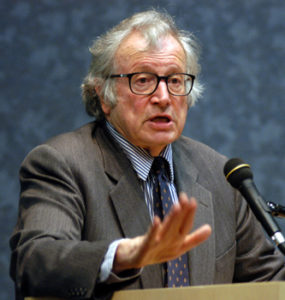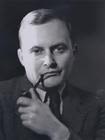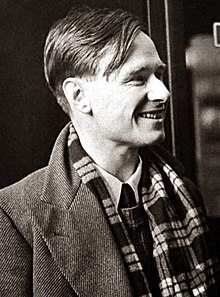 In honor of Peter Stansky’s 90th birthday, Lively is posting reviews of his books. Professor Stansky, an historian of modern Britain, has been Chair of the Stanford history department and served in many leadership positions. These reviews are by Leslie Friedman and appeared in the publications of The Institute for Historical Study.
In honor of Peter Stansky’s 90th birthday, Lively is posting reviews of his books. Professor Stansky, an historian of modern Britain, has been Chair of the Stanford history department and served in many leadership positions. These reviews are by Leslie Friedman and appeared in the publications of The Institute for Historical Study.
Edward Upward: Art and Life. Peter D. L
Stansky (Enitharmon Press, London, 2016)
Long-time member of The Institute for Historical Study member Peter Stansky, Frances and Charles Field Professor of History, Emeritus, Stanford University, has written a classic biography of Edward Upward, a man of mystery. A leading light of the English literary world in the 1930s, he is widely unknown, even though he lived to be slightly older than 105 (1903-2009), was author of twelve books, and still has, posthumously, seven books in print. Stansky’s is the first biography of this important figure. Stansky succeeds at highlighting the details of
Upward’s life while also focusing on the refrain that repeats throughout his life and has universal impact: which must one put first—art or life?
The book’s title demonstrates Stansky’s conclusion that Upward achieved in both.
Edward Upward was born in Essex. His father was a doctor. His father’s family had made
money through the first wholesale grocery import business in England. Welcome to
English, hair-splitting class definitions. To have money is good, but trade is middle class. A
doctor is a professional, but, at the opening of the 20th century, medicine did not have the
cachet it would later achieve. Edward Upward was in the middle (or upper) middle class with
enough advantages to have the childhood of a young gentleman.
He attended a prep school, a reputable public school, Repton, and Corpus Christi College,
Cambridge. He hated these schools. He had good times at sports, saw his early poetry
published in school journals, and won the Chancellor’s Medal for English Verse at
Cambridge. However, schools were for him replicas of Hell. Still, he became a
schoolmaster. He felt the need to support himself; being a schoolmaster gave him security.
Upward saw beating and bullying in schools as a parallel to England’s class system which he
despised. His sense of injustice led him to Marxism-Leninism and, later, membership in
the Communist Party. Whatever his socio-political analysis of school life, he gained an education and friendship that deepened his creative gifts and refined his literary perceptions. Christopher Isherwood, novelist and short story writer, arrived at Reptona year after Upward. Isherwood describes him in his memoir, Lions and Shadows: “Everything about him appealed to me. He was a natural anarchist, a born romantic revolutionary.” (Stansky, 55) Stansky conveys the friendship between Upward and Isherwood in its many levels of understanding and the help they gave each other throughout their lives. Isherwood revered Upward. They were each
other’s first readers of new writing. Isherwood introduced poet W.H. Auden and Upward, in
1927. Auden was three years younger than Isherwood whom he knew from prep school. Though Auden later abandoned the left, Upward’s politics influenced him. Auden
adopted aspects of Upward’s fantasies into early poems. In fact, when Auden gave Upward his
book, Poems, in 1930, the poet wrote in it that he wondered how much he had “filched” from
Upward by way of Isherwood. (Stansky, 131) These literary relationships, as described by
Stansky, put Upward at the center of 1930s English writers, the “Auden Circle.”
Together at Corpus Christi, Upward and Isherwood wrote stories of a fantasy world they
invented. It had a map, characters fulfilling basic village roles, but the stories’ events were
surreal. In the stories of Mortmere, Isherwood and Upward became Starn and Hynd,
professional pornographers. The Mortmere fantasies are obsessed with sex, violence, and
potty jokes. They were the works of brilliant men in their teenage to young adult years.
Upward wrote that Isherwood wrote “about shit-eating and I about necrophilia.” (Stansky, 93)
Upward destroyed his own writing but kept Isherwood’s.
Stansky notes that Upward cites Wilfred Owen, Katherine Mansfield, and Emily Brontë as the
greatest influences on him when an under-graduate. Emily Brontë and her sister Anne,
when ages sixteen and fourteen, created the fantasy island world of Gondal which was then
matched by Charlotte and Branwell with their fantasy island, Angria. These worlds were
preoccupied with war, spies, and romance. One wonders if “Hynd and Starn” knew about
Gondal and Angria and decided to make their own complete world which was on the Atlantic
coast of England rather than in the Pacific like Gondal and Angria. Stansky succeeds in
describing Mortmere’s significance in the English literary tradition of imaginary worlds.
Upward became a master at Alleyn’s School, Dulwich, South London, in 1932 and stayed
until he retired in 1961. The year 1932 was also the year he joined the Communist Party and met his future wife, Hilda Percival, a teacher. Having met Hilda when she gave a talk at a
Party meeting, he recognized she had a different status than previous women he had known. He felt she connected him to the Workers, though Stansky shows she better fit the lower middle
class. Hilda and Edward Upward had a happy family life, including two children. Together
they continued to work for their local Party: going to meetings, selling publications,
spreading the word. His love for Hilda grew throughout their lives. “I am very lucky to have
Hilda,” he wrote to Isherwood. “Marrying her was one of the few really sensible things I’ve done in my life.” (Stansky, 241)
In 1932 Upward also went to the USSR with a group primarily of teachers. The trip helped to put Upward on a watch list for MI5 and the Special Branch of the Police. He had gotten their attention when he contributed to a Daily Worker fund in 1931. Hilda made a trip to Russia in 1933. There were files on both of them. Upward’s life seems quiet, devoted to family, teaching, and faith in Communism while his inner life could be in turmoil. His inner debate did not stop even after he and Hilda left the Party, in 1948. Could he focus on writing and shortchange political action? Would he be just another bourgeois individualist? He led a peaceful life but believed that violent revolution was necessary to change English society. He wrote The Spiral Ascent, his trilogy, in plain, straightforward prose. He abandoned his surrealist style so that workers would have no trouble understanding exactly what he wrote. In 1958, when Upward had a breakdown and might have given up writing, Isherwood wrote to Hilda, sad that his friend might abandon this part of himself. “I feel this not only because I love him but because I’m only a writer myself because of him. At the beginning he taught me everything and I’ve always felt his talent is far greater than mine, even if he hasn’t used it as much.” (Stansky, 287-288)
 Edward Upward older.
Edward Upward older.
Stansky presents good and bad reviews of Upward’s writing and shows how it was
received in the literary world. He doesn’t take sides but does create sympathy for his subject.
Upward was dedicated to writing but had to fight himself to do it.
In addition to being a bourgeois amongst Communists, Upward was a heterosexual among
homosexuals. His best friend, Isherwood, and others of the Auden Circle had active homosexual love lives and partnerships. None of this appears to have ruffled Upward. When
young, he wrote about his need for sexual encounters and described, in less than politically
correct language, to Isherwood how it was working out with the women he saw. He and
Isherwood exchanged this kind of information without hesitation.
Upward believed he needed to be politically active to be able to write. Yet, after the Hogarth
Press published his novel Journey to the Border, in 1938, until he broke with the Party 10 years
later, he could not write. This biography offers insights that will especially excite readers
interested in the 1930s, the literature of the time, the particular character of the English
Communist Party. Upward was a man of mystery in the contradictions within his seemingly calm life. However, it is hardly necessary that a communist should be wild eyed and badly
dressed. Some of these contradictions are stereotypes in the mind of the beholder. His
anxiety over the choice between art and life may have been resolved through writing how he
found, as in the name of the last book of his trilogy, there was “No Home But the Struggle.”
Having written that book, he brought the two into one.
– Leslie Friedman
Thanks to Maria Sakovich, editor, and The Institute for Historical Study for permission to republish this review.

 Christopher isherwood
Christopher isherwood